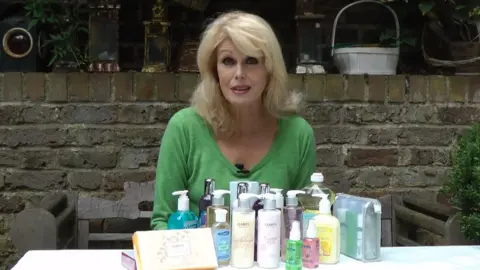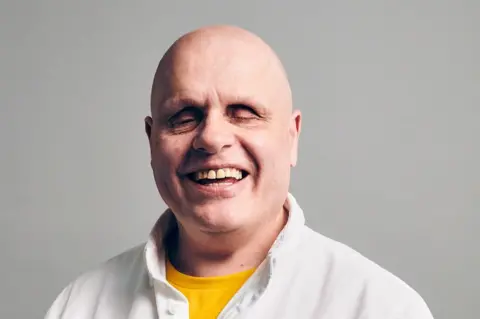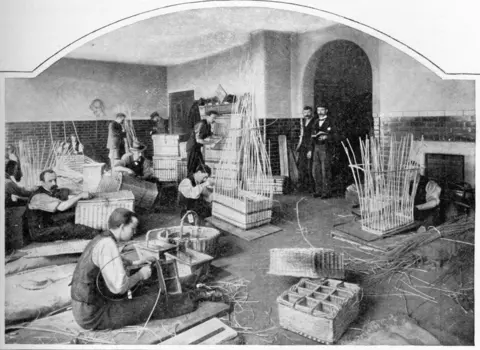Joanna Lumley 'shocked' at claims disabled workers unpaid
 Clarity Products
Clarity ProductsDisabled workers at one of the UK's oldest charitable enterprises, Clarity, have allegedly been denied £200,000 in wages by the new owner.
The company produces toiletries and beauty products under the Clarity, Beco and Soap Co brands.
Actress Joanna Lumley and Sir Iain Duncan Smith MP have spoken out strongly over the claims.
Nicholas Marks, who bought the company last year, says all currently employed staff have been paid.
Community, the union which represents Clarity's workers, claims that a number of disabled employees at the firm have not been paid wages and furlough payments.
 Philip Haynes and TBWA
Philip Haynes and TBWAStephen Steppens, 60, has been blind since birth, and has worked at Clarity since 1985. He is officially on furlough until his redundancy is completed at the end of January.
He says he has received no money since September and has been relying on his savings to get by.
"I loved it," he says of working there. Losing the job, and the fight over the organisation's future, have taken a toll on his mental health, he says.
"I want to see justice done, not just for me, but also for my friends who are visiting food banks."
A number of employees have brought successful employment tribunal claims for unauthorised deduction of wages against Clarity, including Mr Steppens. Clarity was ordered to pay him £706. A number of other employment tribunal claims are ongoing, according to Community.
Joanna Lumley, who had been a supporter of Clarity, called it "the best of the best" and said she was "shocked" to learn of the allegations over treatment of workers. "Justice must be done as soon as possible," she told BBC News.
Clarity was founded in 1854 by a wealthy blind woman, Elizabeth Gilbert, as the Association for Promoting the General Welfare of the Blind, to provide opportunities for workers whom other employers overlooked because of their disabilities. Before the takeover, three-quarters of its staff were disabled people.
 Getty Images
Getty ImagesIts supporters and patrons in the past have included Winston Churchill, Charles Dickens and Queen Victoria.
Clarity went into administration last year, as it was losing money and unable to fund the hole in its pension scheme, according to a spokesman for the administrators, FRP. In January, it was bought by Nicholas Marks.
Sir Iain Duncan Smith, whose London constituency is home to Clarity's headquarters, raised the issue in the House of Commons on 12 January.
"Staff have failed to receive national insurance contributions, with many failing to receive their wages or support while undertaking childcare," he told MPs.
"The total amount that these decent but very vulnerable people have failed to receive is now around £200,000. They cannot claim benefits because they are essentially employed."
Community estimates that about 60 former employees of Clarity are still awaiting payment of their wages and furlough payments, most of them disabled workers.
A spokesman for Nicholas Marks said that Sir Iain's remarks were "highly inaccurate" and the company "does not recognise" the £200,000 figure.
"The grievances echoed by Sir Iain Duncan Smith simply reflect disgruntled ex-employees. All employees currently working have been paid in full up-to-date and the company is dealing with redundancies and gross misconduct of former employees," he said.
Community says it is not aware of any staff who have been dismissed for gross misconduct.
The spokesman for Mr Marks said that Mr Marks had "saved this historic company from permanent failure".
However, other bids for Clarity were made, including one from the well-known social entrepreneur, Cemal Ezel, who runs the Change Please coffee business, which creates opportunities for homeless people.
He is still interested in buying the brands, he told BBC News.
 Change Please
Change PleaseThough Mr Ezel's final bid was slightly higher, the administrators' report says they chose to sell to Mr Marks because he was in a better position to complete the deal by 31 January.
Mr Marks's spokesman said that he had to make "some sensible commercial decisions to place it on to a proper business footing and regrettably some staff had to be let go".
On Wednesday, Clarity's website was still running the Certified Social Enterprise mark, denoting an organisation devoted to "creating positive social change".
The spokesman said Clarity Products was not a social enterprise and was not "purporting to clients" that it was, though it retained the "social enterprise ethos through the continued employment of fully paid disabled staff".
Wrongly using the logo for nearly a year was "simply an oversight", and it is being removed. On Thursday morning, the website was unavailable - the company spokesman said he was not aware why.
In a response to Sir Iain's query, Treasury Minister Jesse Norman wrote that he had "specifically asked HMRC to note the circumstances you describe, and to consider whether and how there may be a case for early intervention".
Another company owned by Mr Marks, a Preston-based caravan maker called Lunar Automotive, was reported to HMRC by the local MP, Sir Mark Hendrick, for allegedly refusing to pay wages and pension contributions for its workers.
This company was also bought out of an administration run by FRP.
Mr Marks's spokesman was not able to comment in detail on the Lunar Automotive case, but said the company had not heard back from HMRC.
